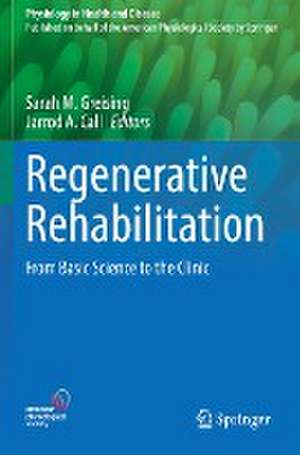Regenerative Rehabilitation: From Basic Science to the Clinic: Physiology in Health and Disease
Editat de Sarah M. Greising, Jarrod A. Callen Limba Engleză Paperback – 3 iun 2023
Combining basic, translational, and clinical aspects of the topic, the book offers a valuable resource for both scientists and clinicians in the regenerative rehabilitation field.
| Toate formatele și edițiile | Preț | Express |
|---|---|---|
| Paperback (1) | 1293.03 lei 6-8 săpt. | |
| Springer International Publishing – 3 iun 2023 | 1293.03 lei 6-8 săpt. | |
| Hardback (1) | 1300.36 lei 6-8 săpt. | |
| Springer International Publishing – 2 iun 2022 | 1300.36 lei 6-8 săpt. |
Din seria Physiology in Health and Disease
- 18%
 Preț: 952.26 lei
Preț: 952.26 lei - 5%
 Preț: 1457.78 lei
Preț: 1457.78 lei - 5%
 Preț: 1169.42 lei
Preț: 1169.42 lei - 5%
 Preț: 1291.72 lei
Preț: 1291.72 lei - 5%
 Preț: 1296.49 lei
Preț: 1296.49 lei - 5%
 Preț: 1416.66 lei
Preț: 1416.66 lei - 5%
 Preț: 1107.06 lei
Preț: 1107.06 lei - 5%
 Preț: 715.71 lei
Preț: 715.71 lei - 5%
 Preț: 694.39 lei
Preț: 694.39 lei - 5%
 Preț: 910.82 lei
Preț: 910.82 lei - 5%
 Preț: 1295.24 lei
Preț: 1295.24 lei - 5%
 Preț: 1106.69 lei
Preț: 1106.69 lei - 5%
 Preț: 1159.55 lei
Preț: 1159.55 lei - 5%
 Preț: 1289.90 lei
Preț: 1289.90 lei - 20%
 Preț: 769.59 lei
Preț: 769.59 lei
Preț: 1293.03 lei
Preț vechi: 1361.08 lei
-5% Nou
Puncte Express: 1940
Preț estimativ în valută:
247.45€ • 257.39$ • 204.29£
247.45€ • 257.39$ • 204.29£
Carte tipărită la comandă
Livrare economică 14-28 aprilie
Preluare comenzi: 021 569.72.76
Specificații
ISBN-13: 9783030958862
ISBN-10: 3030958868
Ilustrații: X, 459 p. 55 illus., 49 illus. in color.
Dimensiuni: 155 x 235 mm
Greutate: 0.65 kg
Ediția:1st ed. 2022
Editura: Springer International Publishing
Colecția Springer
Seria Physiology in Health and Disease
Locul publicării:Cham, Switzerland
ISBN-10: 3030958868
Ilustrații: X, 459 p. 55 illus., 49 illus. in color.
Dimensiuni: 155 x 235 mm
Greutate: 0.65 kg
Ediția:1st ed. 2022
Editura: Springer International Publishing
Colecția Springer
Seria Physiology in Health and Disease
Locul publicării:Cham, Switzerland
Cuprins
Chapter 1. Historical Perspectives of Regenerative Rehabilitation: Recovering and Restoring Functional Capacity.- Chapter 2. Considerations for Small Animal Physical Rehabilitation.- Chapter 3. Regenerative Rehabilitation for Nonlethal Muscular Dystrophies.- Chapter 4. Regenerative Rehabilitation for Duchenne Muscular Dystrophy.- Chapter 5. Regenerative Rehabilitation in Sarcopenia, Dynapenia and Frailty.- Chapter 6. Pathophysiology of Volumetric Muscle Loss and Targets for Regenerative Rehabilitation.- Chapter 7. Novel Cell-Based Therapeutics for Diseases of the Heart and Skeletal Muscle.- Chapter 8. Regenerative Rehabilitation Strategies for Complex Bone Injuries.- Chapter 9. Biomaterials in Connective Tissue Regeneration and Rehabilitation.- Chapter 10. Ultrasound Stimulation of Tendon Healing: Current Strategies and Opportunities for Novel Therapeutic Approaches.- Chapter 11. Mechanical Stimulation as Both the Cause and the Cure of Tendon and Ligament Injuries.- Chapter 12. Methods to Enhance the Beneficial Effects of Exercise in Individuals with Spinal Cord Injuries.- Chapter 13. Emerging Approaches for Regenerative Rehabilitation Following Traumatic Brain Injury.
Notă biografică
Sarah M. Greising
School of Kinesiology
University of Minnesota
Minneapolis
Minnesota
USA
Jarrod A. Call Department of Kinesiology
University of Georgia
Athens
Georgia
USA
University of Minnesota
Minneapolis
Minnesota
USA
Jarrod A. Call Department of Kinesiology
University of Georgia
Athens
Georgia
USA
Textul de pe ultima copertă
This contributed volume presents the current state of research on regenerative rehabilitation across a broad range of neuro- and musculoskeletal tissues. At its core, the primary goal of regenerative rehabilitation is to restore function after damage to bones, skeletal muscles, cartilage, ligaments/tendons, or tissues of the central and peripheral nervous systems. The authors describe the physiology of these neuro- and musculoskeletal tissue types and their inherent plasticity. The latter quality is what enables these tissues to adapt to mechanical and/or chemical cues to improve functional capacity. As a result, readers will learn how regenerative rehabilitation exploits that quality, to trigger positive changes in tissue function.
Combining basic, translational, and clinical aspects of the topic, the book offers a valuable resource for both scientists and clinicians in the regenerative rehabilitation field.
Caracteristici
Highlights an emerging field of research that bridges basic research and clinical treatment Collects comprehensive research from multiple tissue types Incorporates basic physiology in regenerative medicine and rehabilitation
